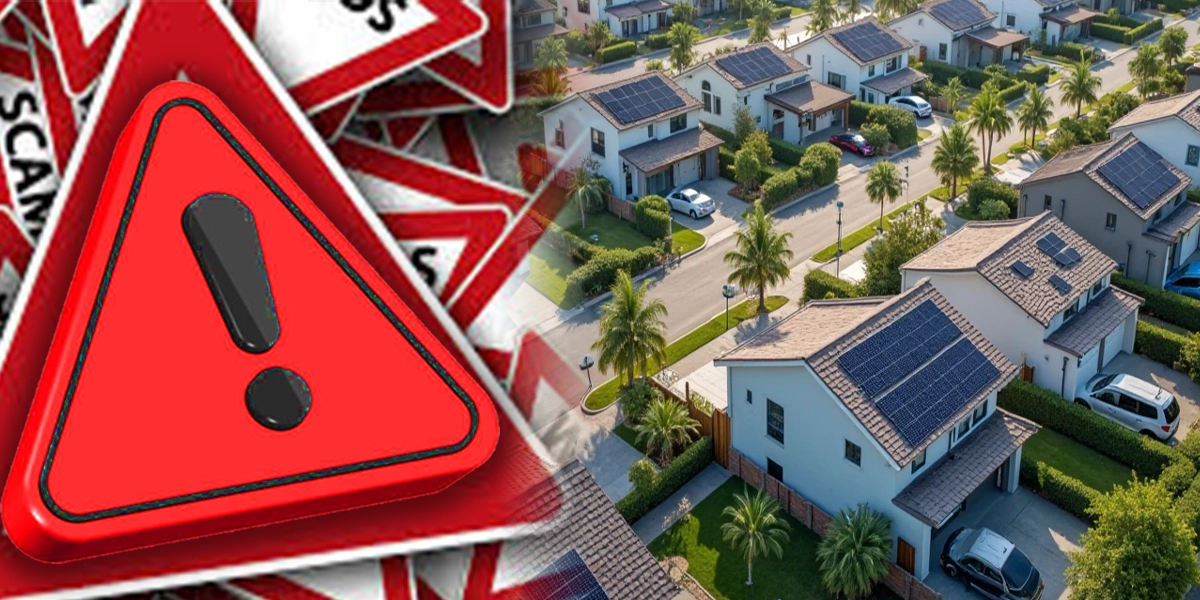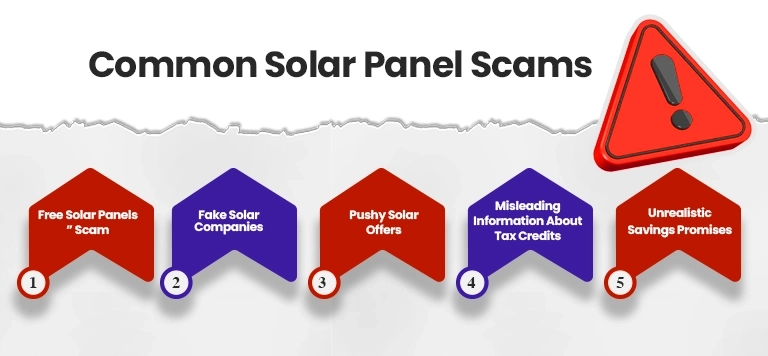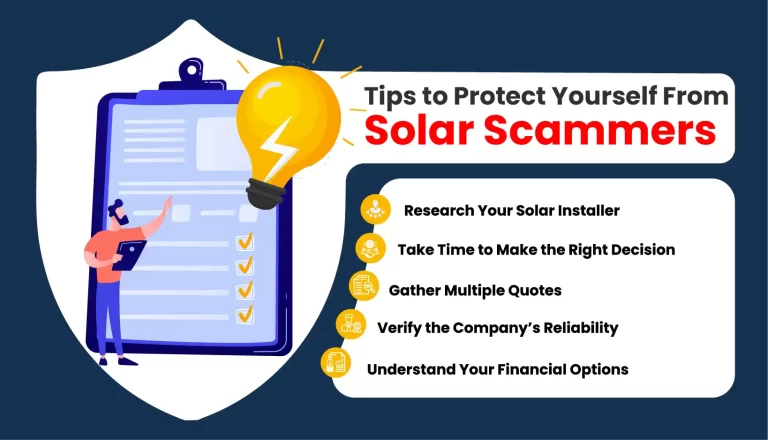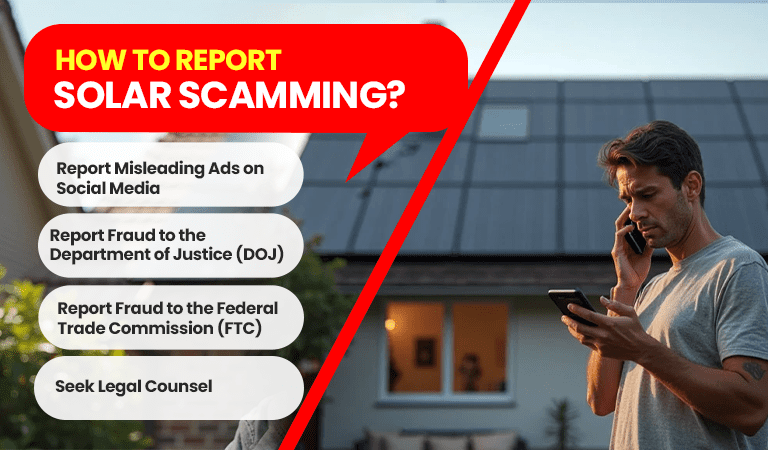- Updated On: July 30, 2025
Solar Panel Scams: Common Red Flags and Safe Steps for You
Solar panel installation can be one of the most worthwhile decisions you ever make. Solar is already saving millions of Americans on their energy bill, and solar incentives are making going solar more affordable. With the solar industry growing so fast, so does the rise in misinformation and solar panel scams. Not every company providing “zero-cost solar” or “government-approved programs” is in your best interest. Several people reported that they are trapped by hard sales techniques, unlicensed roofers, hidden fees, or false representatives claiming they work for utility companies. Most often, scammers use pressure and jargon to scare or intimidate you into acting quickly.

Being aware of the warning signs of a solar scam is as important as understanding how solar works. In this guide, we will walk you through the most common solar company scams, the most influential red flags to be aware of, and the safe and smart steps you should take to protect yourself and your investment.
What are the common solar panel scams?
As the solar industry becomes more competitive, more solar scams have arisen. Here are some common solar panel scams to look out for.

"Free Solar Panels" Scam:
You’ve probably seen the advertisements about “free solar panels” if you’ve been looking for solar. But, in reality, these companies promote “third-party ownership” including PPA and solar lease programs. This agreement, as the name implies, involves agreeing to allow a solar panel company to put solar on their roof. And, in exchange, the customer pay a monthly lease payment for using solar power. Although the installation is technically “free,” however, you need to pay monthly fees to the firm. It makes sense why these businesses are prepared to put “free” solar panels on your roof.
Some people may find solar leases and PPAs to be a good option, but you must be extremely cautious when evaluating a company that provides these third-party ownership options. Contracts typically range from 20 years or longer, and some businesses have escalator clauses that raise monthly payments annually.
Fake Solar Companies:
One of the most common solar scams is setting up a fake business and “selling” solar panel installations with no plans to install them. These fraudulent businesses might ask for a large cash deposit and then disappear before ever completing any work. Also, you might be asked to fill out false solar paperwork by scammers posing as solar representatives, who will then use your personal information to steal your identity. Moreover, if you ask them about their licences, they will hesitate as they do not have any licences.
Pushy Solar Claims:
Generally, when a pushy salesperson informs you that there are special solar programs that will expire, you cannot believe them. Some state and local solar rebates can be offered once a year and have a finite fund. But an honest salesperson will be capable of naming the program and directing you to the respective website for that solar rebate. Also, there are some salespeople who may make you think that a “limited-time offer” is yours only if you enroll that day.
The trick to thinking about solar power for your house or office is to get several bids and spend some time looking over the numbers and the businesses. To make a smart choice, you do not have to dash and compare all things.
Misleading Information:
The federal solar tax credit is one of the most confusing incentives. Scammers may also try to lure you with offers like “you’ll get a large cheque from the government” or “you’ll only get a cheque if you’ve already paid funds to the government in the form of estimated tax payments or regular payroll deductions.”
You should be aware, though, that it is a tax credit and not a refund, deduction, or rebate. You can also only claim up to the amount of what you would have paid in taxes for the year because it is non-refundable.
Consult with experienced solar professionals like Solar SME first to determine more about how the federal solar tax credit works.
Unrealistic Promises:
Before even examining your roof in detail or even taking your electricity bills, a solar scam company may make false claims about how much money you will save with solar panels. However, an honest solar supplier like Solar SME will let you know the best solar solutions for your home. And they’ll let you know if solar panels aren’t a good investment, either because your roof is too shaded or small, or for some other reason, like the fact that you have bad credit.
How to protect yourself from solar scams?
We strongly suggest that you research and verify the reliability of your solar installer before signing any contract. It will help to prevent yourself from being a victim of solar panel scams.

Take Time to Make the Right Choice:
Never sign a contract too quickly. Scammers will pressure you into signing a costly solar contract before you read the agreement terms. Solar legal businesses, on the other hand, will guide you to make an informed decision by revealing all the details you require. If your solar company does not like to answer your questions or pushes you into signing up on the spot, it is a warning sign.
Get Several Quotes:
A second opinion is always a good thing. That is why we suggest contacting installers in your neighborhood and asking for them to provide you with quotes. It won’t hurt to shop around because different companies may tell you completely different things about your system and prices.
Verify the Company Reliability:
We recommend checking the company’s credentials and licensing, reading customer testimonials, and if they are listed on genuine websites such as the Better Business Bureau (BBB), Energysage or Google My Business to make sure your solar installation company is reliable.
Understand Your Financial Options:
You may discuss with a tax professional whether you can claim the federal tax credit and any state incentives for which you are eligible. Think about hiring an investment professional to let you know whether solar is still the best overall option compared to your next best alternative.
How to report solar scamming and seek legal assistance?
If you encounter any of the solar panel scams, you should consider reporting them to various authorities.

1. If you see any deceptive or fake promotion or advertisement from a solar scamming company, you can report it on social media for removal.
2. The FTC website allows you to report fraud cases. The FTC will provide law enforcement with your report so they can look into it and file complaints against companies that mislead consumers or commit fraud.
3. You can notify the DOJ about fraud or scams in your state or community. To begin your report, go to the DOJ page for your state.
4. If you are caught in a scam, you can take legal action against that company and file a case.
Overall, in the US, hundreds of solar companies value their clients, strive to offer top-notch service at competitive pricing, and maintain long-term relationships. Unfortunately, on the other side, there are some fraudulent businesses and solar scammers that deceive consumers. Therefore, before hiring a solar installer, you should always do your homework and keep an eye out for any potential solar scams.
Solar SME is a trusted local solar installer near you. We are NABCEP certified and also have business licenses in various states. You can check out our presence on Energysage and BBB. So, if you are planning your solar installation, get a FREE Quote with our smart solar calculator!
Related Articles:
If you have ever wondered how solar panels work you are not alone. People around the world have studied solar energy for nearly 200 years.
The “Federal Solar Tax Credit” is one of the most valuable federal incentives that helps you to cut your PV system cost by 30%. However, it is only available till December 31, 2025. So, now is the best time to switch solar with low installation cost. Explore more!
Net metering is also known as net energy metering (or NEM). It is a process that allows you to send extra energy generated by their solar panels system to the electrical grid and earn credits. However, the policies vary by state. Learn more about NEM states!



